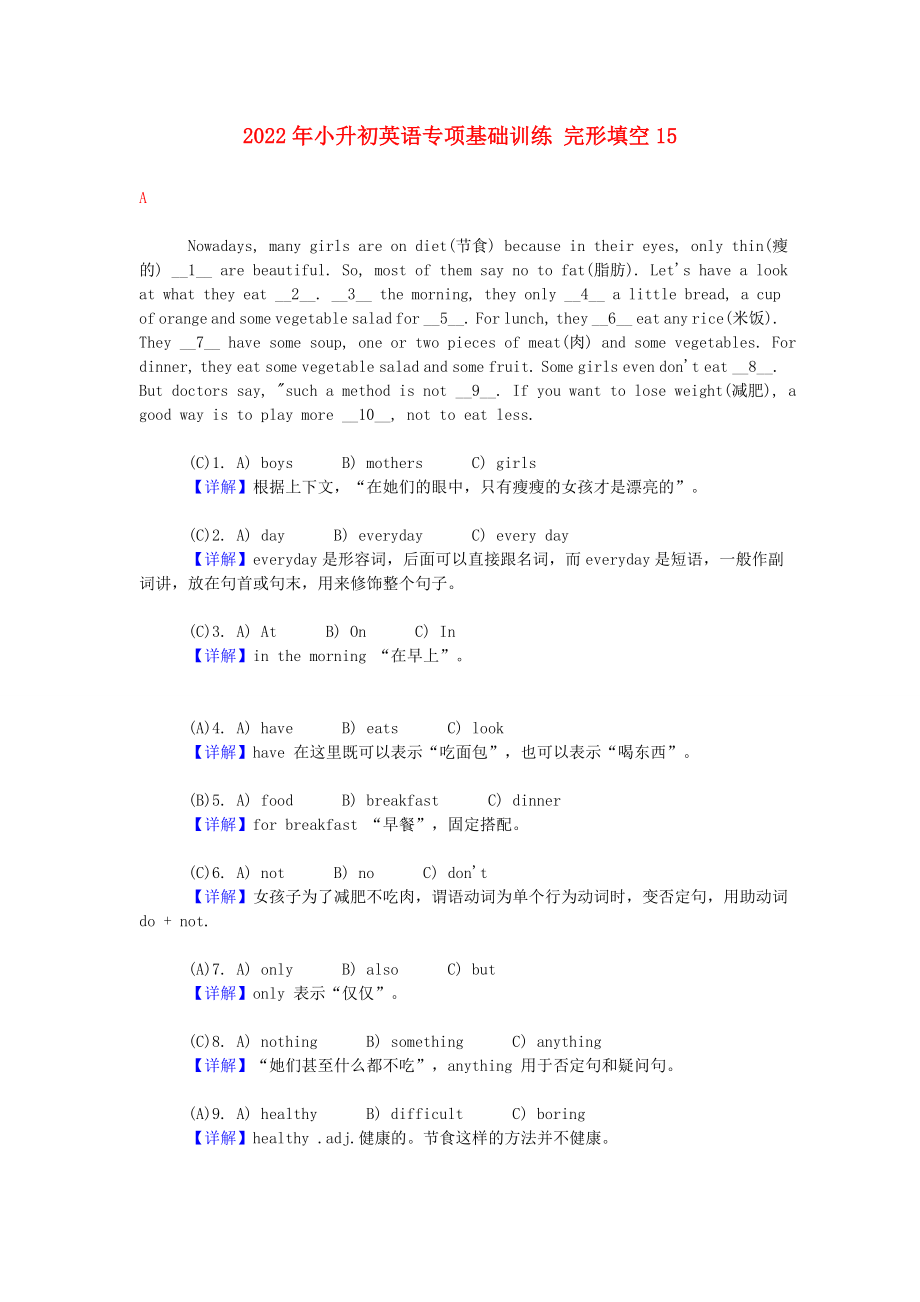《2022年小升初英語(yǔ)專項(xiàng)基礎(chǔ)訓(xùn)練 完形填空15》由會(huì)員分享���,可在線閱讀��,更多相關(guān)《2022年小升初英語(yǔ)專項(xiàng)基礎(chǔ)訓(xùn)練 完形填空15(2頁(yè)珍藏版)》請(qǐng)?jiān)谘b配圖網(wǎng)上搜索�。
1��、2022年小升初英語(yǔ)專項(xiàng)基礎(chǔ)訓(xùn)練 完形填空15
A
Nowadays, many girls are on diet(節(jié)食) because in their eyes, only thin(瘦的) __1__ are beautiful. So, most of them say no to fat(脂肪). Let's have a look at what they eat __2__. __3__ the morning, they only __4__ a little bread, a cup of orange and some vegetable sal
2�、ad for __5__. For lunch, they __6__ eat any rice(米飯). They __7__ have some soup, one or two pieces of meat(肉) and some vegetables. For dinner, they eat some vegetable salad and some fruit. Some girls even don't eat __8__. But doctors say, "such a method is not __9__. If you want to lose weight(減肥),
3、a good way is to play more __10__, not to eat less.
(C)1. A) boys B) mothers C) girls
【詳解】根據(jù)上下文����,“在她們的眼中,只有瘦瘦的女孩才是漂亮的”�。
(C)2. A) day B) everyday C) every day
【詳解】everyday是形容詞,后面可以直接跟名詞�,而every day是短語(yǔ),一般作副詞講���,放在句首或句末�,用來(lái)修飾整個(gè)句子��。
(
4�、C)3. A) At B) On C) In
【詳解】in the morning “在早上”。
(A)4. A) have B) eats C) look
【詳解】have 在這里既可以表示“吃面包”�����,也可以表示“喝東西”。
(B)5. A) food B) breakfast C) dinner
【詳解】for breakfast “早餐”����,固定搭配。
(C)6. A) not B) n
5�����、o C) don't
【詳解】女孩子為了減肥不吃肉�,謂語(yǔ)動(dòng)詞為單個(gè)行為動(dòng)詞時(shí),變否定句����,用助動(dòng)詞do + not.
(A)7. A) only B) also C) but
【詳解】only 表示“僅僅”。
(C)8. A) nothing B) something C) anything
【詳解】“她們甚至什么都不吃”��,anything 用于否定句和疑問(wèn)句���。
(A)9. A) healthy B) di
6���、fficult C) boring
【詳解】healthy .adj.健康的�。節(jié)食這樣的方法并不健康。
(B)10. A) class B) sports C) balls
【詳解】這里表示“要減肥應(yīng)該是多運(yùn)動(dòng),而不是節(jié)食”�。
B
A: I can't find my watch. __1__ it?
B: It's in your desk, I think.
A: Let me see. Oh, no, it isn't in it.
7、
B: Let's ask Wang Lei.
A: OK! Wang Lei, do you see my watch?
C: Oh, dear! Here are three watches in my bag. What color is yours?
A: It's black.
C: Good! __2__ you are.
A: Thank you very much.
C: That's __3__. But, the red one is mine. __4__ is the bro
8����、wn one?
B: Let me have a look. Oh. It's Jim's.
C: Let's go and give it __5__ Jim.
A: OK! Let's go.
(B)1. A) Where B) Where's C) Where are D) Is
【詳解】特殊疑問(wèn)句由特殊疑問(wèn)詞+一般疑問(wèn)句構(gòu)成,where + is/are...?,根據(jù)主謂一致原則���,it的謂語(yǔ)動(dòng)詞用單數(shù)is.
(D)2. A) It B)
9��、They C) There D) Here
【詳解】Here you are 固定用法��,表示“給你”�。
(D)3. A) right B) all C) it D) OK
【詳解】根據(jù)上文�����,回答別人的感謝用That's OK. 表示“不用謝”���。
(A)4. A) Whose B) Who's C) Who D) What
【詳解】whose 詢問(wèn)“誰(shuí)的”����,意為:這個(gè)棕色的是誰(shuí)的呢��?
(C)5. A) in B) on C) to D) of
【詳解】介詞to 表示對(duì)象,意為:讓我們把它給Jim 吧����。
 2022年小升初英語(yǔ)專項(xiàng)基礎(chǔ)訓(xùn)練 完形填空15
2022年小升初英語(yǔ)專項(xiàng)基礎(chǔ)訓(xùn)練 完形填空15

